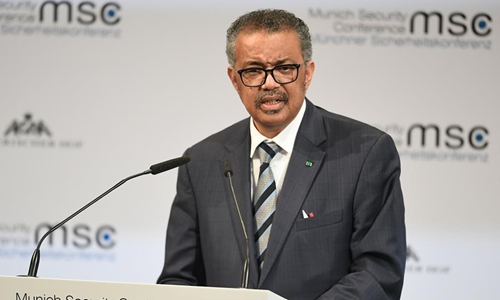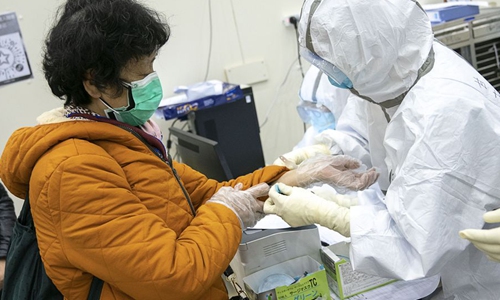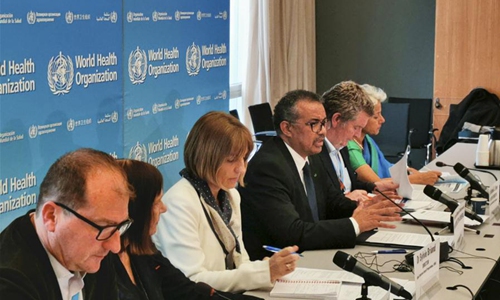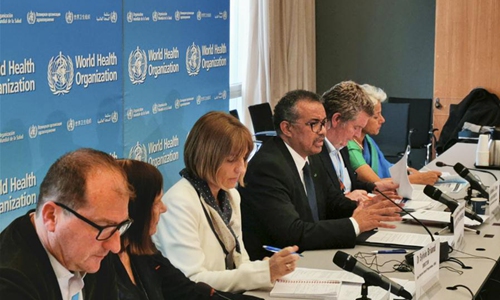
The World Health Organization Director-General Tedros Adhanom Ghebreyesus speaks at the 56th Munich Security Conference in Munich, Germany, on Saturday. Photo: Xinhua
The 56th Munich Security Conference (MSC), held in Munich, Germany, from Friday to Sunday, featured a panel discussion on global health security amid the outbreak of the novel coronavirus pneumonia (COVID-19).
In his address to the MSC, Tedros Adhanom Ghebreyesus, director-general of the World Health Organization (WHO), appealed to global leaders not to politicize the deadly virus, and called for solidarity in fighting the epidemic.
The COVID-19 is a global common threat, with hundreds of cases confirmed in countries and regions beyond China. As Tedros said, health is one of the few fields in which international cooperation provides an opportunity for countries to work together for a common cause. Global coordination plays a key role in tackling the disease.
Unfortunately, while the Chinese people spare no effort in battling the fatal virus, the rhetoric and moves by a few Western politicians and media outlets have added insult to injury. Their conduct is seen as beyond the moral baseline of human civilization. No matter which country suffers from a threat to public health, the international community should offer unconditional support and sympathy.
Some US government officials and elites are themselves suffering from schadenfreude, as they have been seen and heard seemingly deriving pleasure from China's misfortune. US Commerce Secretary Wilbur Ross, for example, in late January said the epidemic "will help to accelerate the return of jobs to North America." White House advisor Peter Navarro has also smeared China, calling it a "disease incubator." Some Western media outlets have despicably fueled racial discrimination and anti-China sentiment. The Wall Street Journal published an article under the headline "China is the Real Sick Man of Asia." Fueling racism and offering no sympathy for the suffering of others will be seen as contemptible by the international community.
A few countries have ignored recommendations made by the WHO and have overacted to the outbreak by suspending flights to and from the Chinese mainland. Rather than contributing to the prevention and control of the epidemic, these moves have caused unnecessary panic and baseless fears, and severely disrupted normal people-to-people exchanges and cooperation.
China advocates tackling the global common health threat by engaging in multilateral cooperation. In recent years, during global health threats, including the spread of Ebola (EVD), H1N1 flu, and MERS-CoV, China generously lent helping hands and fully cooperated with relevant countries and international organizations.
Amid the outbreak of the EVD, China chartered large aircraft to ship the first batch of badly needed anti-epidemic supplies, and deployed an entire unit of epidemic prevention personnel and military medical staff overseas.
Amid the outbreak of COVID-19, China has taken the strictest measures to prevent and control the virus' proliferation, with moves that are not only aimed at ensuring the health of Chinese people, but that of people around the world as well. As Tedros said of China, China's actions actually have helped prevent the spread of coronavirus to other countries.
China has been open and transparent in its fight against the epidemic, releasing accurate information on a daily basis. It exchanges with other countries and regions as well as the WHO information on the mutations of the coronavirus. China has also shared the genetic sequence of the coronavirus with the rest of world. These moves are a model for others to follow.
China's efforts have been praised by top leaders from many countries and regions. Russian President Vladimir Putin said, "The Chinese authorities are taking decisive and vigorous measures to stop the epidemic."
In the era of globalization, the outbreak is the common foe of all humanity. In the face of the epidemic, countries around the world should abandon their "zero-sum" mentality, and ramp up cooperation. Indifference is not feasible, and fishing in troubled water is unethical.
The international community needs to overcome these difficulties to optimize mechanisms for disclosing information about the outbreak, reinforce capabilities to engage in international health cooperation, and conduct joint scientific research to develop effective vaccines and drugs.
When crucial public health emergencies occur, mutual assistance between nations is the only valid way to address such a plight, and maintain regional and global public health security.
The author is a research fellow at the PLA Naval Military Studies Research Institute. opinion@globaltimes.com.cn



